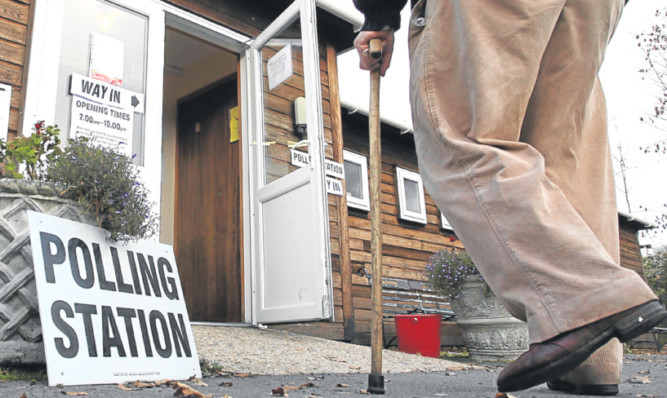
Impact of austerity on the over-55s weighs heavily with parties as election looms.
On the cusp of the last General Election, David Cameron warned we were entering a new age of austerity. A bleak message which was dutifully, gleefully some argue, executed in most areas of the public sector in the five years of Tory/Lib Dem Government that have followed. But with one notable exemption any spending directly linked to older people.
The state pension, winter fuel payments, free bus passes and now subsidised pensioner bonds are just some of the sacred cows which have remained largely unscathed as spending has been slashed in every other area of government.
The benefit of this may not be apparent to pensioners still struggling to heat their homes or put food on the table, but in truth the pain of the austerity agenda has been more keenly felt elsewhere.
The reason is simple, there are more older than younger voters and, crucially, they are more likely to vote.
So this makes the grey vote even more crucial in a General Election which looks too tight to call with just over 70 days to go.
Issues affecting older voters and pensioners are fairly uniform across the UK but May’s vote has an interesting added dimension in the shape of the referendum.
We are more than five months on from the independence vote, yet it remains the compass for navigating most issues in Scottish politics.
Speaking in the days after the referendum, former First Minister Alex Salmond said his side’s defeat could be partly explained by a “generational thing at work”. Put simply, people over the age of 55 his generation voted to reject independence.
Mr Salmond added: “I think people my age, all of us, should look in the mirror and start to question ourselves as to whether we mustn’t hold the next generation back in Scotland.”
Such provocative chatter will be in short supply as he attempts to persuade older voters of Gordon to return him to Westminster, but the ex-SNP leader touches on a crucial point what will happen to the votes of older Scots post-referendum?
The “no thanks” message from Scots pensioners was clear in last year’s referendum. A poll by Lord Ashcroft the day after the referendum showed older voters were the most decisively opposed to independence, with nearly three quarters (73%) of those aged 65 or over voting No. But this age group was always going to be an uphill challenge for the Yes campaign, a point proven by the same poll showing 62% of No voters knew they were going to reject breaking up the UK from the outset.
However, Lord Ashcroft’s poll also showed that all is not lost for the SNP, the driving force behind the campaign for independence. A total of 28% of those over the age of 65 said they backed the SNP at the 2011 Holyrood elections, the same percentage as backed Labour.
SNP strategists also point to the progress they had made with voters over the age of 60 in the last four years.
A YouGov poll conducted in 2011 had the SNP Westminster vote among those over the age of 60 at 26%. The latest poll by the same firm shows support from the over-60s at 42%.
Labour, in contrast, has dropped from 41% to 31% over the same period with pensioners.
A senior source in the SNP’s election campaign said they would be making a big play for older voters in the coming months.
They said: “We have big support and even bigger potential among older voters many of whom who voted No in the referendum are considering voting SNP at the General Election and next year’s Holyrood election.
“We will present attractive policies for older people in Scotland, and also stand on our record of protecting the free bus pass and free personal care, and delivering an end of prescription charges.”
Polling guru Professor John Curtice said it was difficult to distinguish any shift in older voters to the SNP because of the party’s general buoyancy in the polls.
He said: “The SNP are of course more popular among all voters now than they were for Westminster back in 2011. So it is no surprise that there are more SNP Westminster voters now than there were in May 2011. The increases among over-60s are simply in line with the increase among all voters. The evidence of the last four polls is clear. The SNP still are, in most cases, ahead by around 10 points.”
It is important to make clear that it has not been a bed of roses for all older voters in the last five years. More than 13,000 women between the ages of 50 and 64 in Scotland are currently unemployed, a hike of 30% since 2010. This represents an opportunity for the party neither in government at Holyrood or Westminster.
Scottish Labour strategists, some of whom were involved in the No campaign and are well aware of the power of the grey vote, are also targeting older voters.
Labour’s Shadow Scottish Secretary, Margaret Curran, has been campaigning on the challenges of getting older women into work, an issue often squeezed out by the focus on youth unemployment.
Unemployment among older women has risen while falling in the general population, so it is an area ripe for tackling and Labour has set up a commission to address the issue.
Whatever the outcome in May, it is unlikely that older voters will lose out under the next government so it if you are in possession of both a vote and grey hair, use your influence wisely.

Enjoy the convenience of having The Sunday Post delivered as a digital ePaper straight to your smartphone, tablet or computer.
Subscribe for only £5.49 a month and enjoy all the benefits of the printed paper as a digital replica.
Subscribe